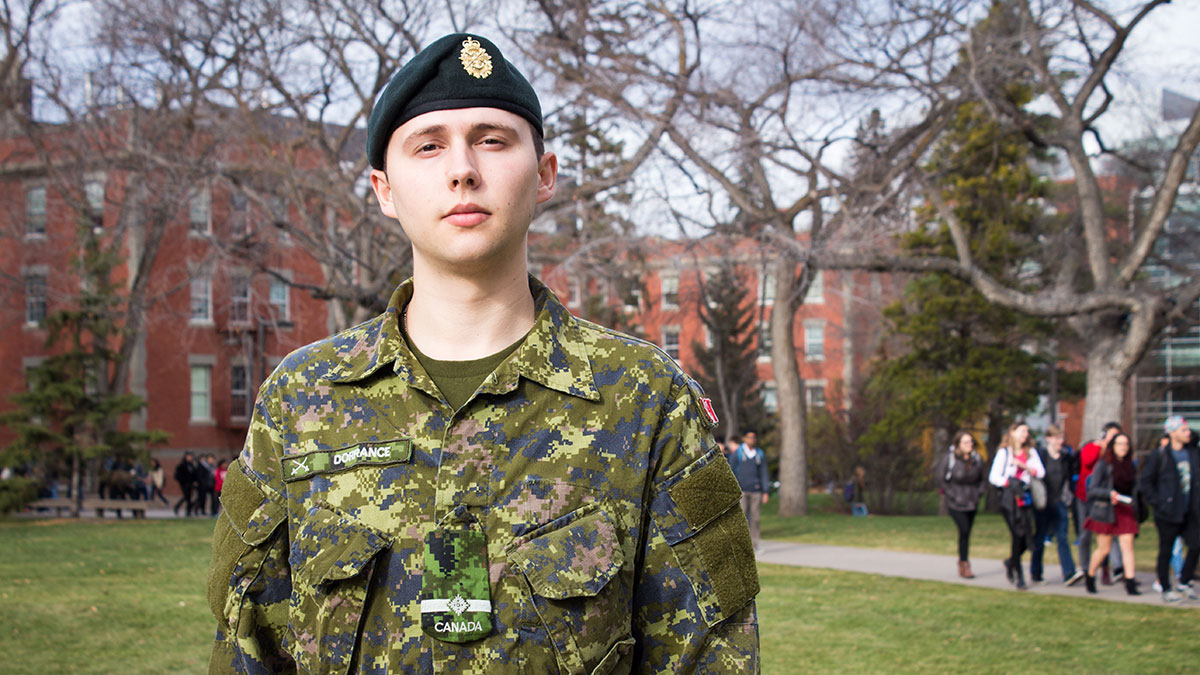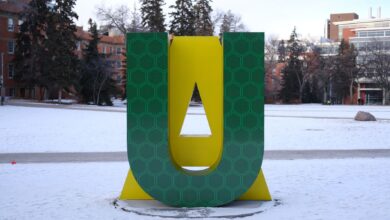Camo & Coursework: Students in the Military
 Christina Varvis
Christina VarvisJim Dorrance never really liked commissioned officers.
He saw commissioned officers, who require a university degree and more managerial and leadership positions, rise through the Canadian military ranks quicker than a more experienced and knowledgeable non-commissioned member (NCM) would. It was an attitude that’s typical among NCMs, the tradespeople and operators of the military who do more “dirty work,” as they tend to view some commissioned officers as “cocky” and difficult to respect.
Jim, an NCM, held the rank of Chief Warrant Officer, which was a “big deal” to his son, Sean, who always wanted to follow in his father’s footsteps.
In kindergarten, Sean and his classmates were asked what they wanted to be when they grew up. Of course, Sean penned and coloured a drawing of his dad outfitted in his Canadian Forces uniform.
“That’s what I always wanted to be,” Sean says, looking back. “My dad always took me to the base. He worked in the armoury and he drove tanks so he always let me inside and start them up. That just sort of made me fall in love with the whole atmosphere.”
Trips to the gas and diesel scented tank silo and flipping switches to start up the armoured vehicles “wowed” the five-year-old Sean. He vividly remembers laughing so hard the first time he climbed into a tank because of how “cool” it was.
In the summer of 2014, he decided to enlist in the military as an NCM, much like his father.
He was was shocked when Jim convinced him to go to university and take the commissioned route instead.
“My parents convinced me that I shouldn’t waste being smart, and that I should get a good education,” Sean says. “And if (the military) is going to pay for it, why not?”
To become an officer in the Canadian Forces, applicants must have a university degree that relates to the occupation they choose when enlisting. Occupations that officers own require high academic standings and extensive leadership training, and include jobs such as bioscience officer, electrical and mechanical engineering officer, legal officer, medical officer and pharmacy officer. New recruits begin their journey as cadets and once they graduate from their university program, they earn the commissioned officer rank. They are also guaranteed the career they choose, Sergeant Ryan Sebo, a Canadian Forces recruiter, says.
“It’s one of — if not the most — secure occupation choices you can make in Canada,” Sebo says. “We will give applicants insight into different occupations. We are not trying to force anyone to take a specific path.”
Sebo, who has been in the Canadian Forces for the last 10 years and having worked at the Regular Force Recruiting Centre in Edmonton for the last year, says high school students visit the centre daily with questions about what the military can do for them, and if completing a university degree while enlisting is worth it. Students much like Sean.
Sean’s tuition, books, lab fees and student fees are covered by the military. He doesn’t need a part-time job like his friends do, and considers his academic schedule much easier to balance than other students.
“I wake up at 7 a.m., have breakfast, go to class, do homework and watch TV,” Sean says of average Fall and Winter semester. “I barely have to do anything.”
But his summers training at Saint-Jean Garrison in Quebec are much different.

“We get yelled by our commanding officers at a lot,” Sean says with a light chuckle. “That’s always interesting.”
The tight schedule is all too familiar for political science major Dave Jones, as well. Jones enlisted in the military right after high school in 2009. Cramming for midterms may seem slow compared to the daily routine in the infantry.
“You never have enough time,” Jones says, recalling his time training. “It’s a structural design to make you deal with stress and how to make decisions when imposed under pressure. It’s like there was always a sort of game being played with you.”
Jones values the sense of doing something for his country as much as he values education. He wanted to complete his degree, which taught him the basics of development, and what constitutes Canadian society. But he can’t get over what people think of him when he tells them he’s in the Canadian Forces.
“People kind of look at you weird, and even think less of you at times,” Jones says. “People in our generation, for whatever reason, don’t see service as a viable or honourable thing to do.
“Their first response is, ‘Oh, but you’re smart.’”
Despite their misguided conceptions about the military and its perceived “meathead” personnel, Jones believes he enlisting in the Canadian Forces Primary Reserves was the smart decision.
University and the military are an “interesting juxtaposition” for Jones, and to him they’re fun in their own, very different ways. But in 2013, Jones left the military. He was in a dark place mental health wise, and even saw himself slacking off during training activities. Right now, Jones is focused on finishing his political science degree in April 2015 and maybe starting a master’s program at the U of A. He’s also re-submitted an application to rejoin the reserves following convocation. His reasons to re-enlisting in the forces may sound pathetic, he admits.
“I want to make a difference,” Jones says. “It’s as complicated and simple as that. I think that service is an honourable thing, but I feel like if our generation appreciates it enough, it’s incumbent on you to do something to help them realize that.”
Sean Dorrance feels the same way. He wants to use his psychology degree and apply it to his fascination with mental disorders such as post-traumatic stress disorder and how the mind works. He also wants to learn and understand how the mind works in battle situations.
For students in the Canadian Forces, the military is more than just deployment to Afghanistan, firing C7 assault rifles and shooting projectiles from highly armoured vehicles like the tanks which introduced Sean to the army 15 years ago.
“People usually don’t understand what the military is all about,” Sean says. “We do so much more than just war, and people don’t seem to realize that.”




